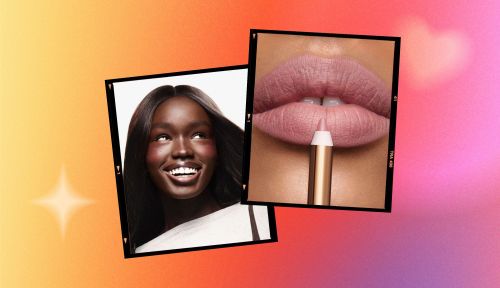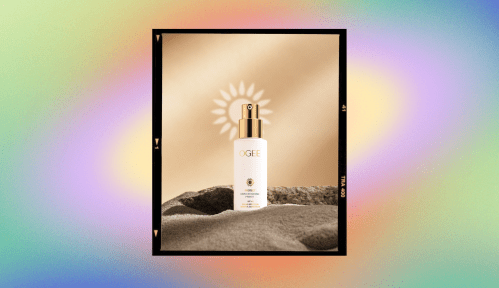Our editors independently select these products. Making a purchase through our links may earn Well+Good a commission
These Are the Best OTC Retinol Creams and Serums, According to Dermatologists
If you're not sure how to sort through the sea of retinol products, take a look at some of these derm-approved retinol creams.

If your dull skin, dark spots, or fine lines have been making you toss and turn, retinol cream may just be calling your name. Over the years, retinol has emerged as a skin-care juggernaut, thanks to its many anti-aging benefits and powerful effects on transforming skin. But in a sea of over-the-counter (OTC) products and overly-hyped marketing, it can be tricky to separate what’s fact from fiction regarding this buzzy ingredient. In order to find out what’s the best retinol cream for you, let’s start with some of the basics first.
Experts in This Article
director of cosmetic and clinical research in dermatology and associate professor of dermatology at Mount Sinai Hospital
board-certified dermatologist based in San Diego
board-certified dermatologist at Skin &
board-certified dermatologist
board-certified dermatologist
What is retinol?
Retinol is a vitamin A derivative that comes from the larger family of retinoids. It’s most commonly used in OTC products because it’s less harsh than its retinoid cousins. But don’t let that fool you—it’s still a heavyweight champion among skin-care ingredients, especially when it comes to delivering positive effects on problematic skin. In fact, many people use it to help treat an array of skin concerns, including any possible causes of hyperpigmentation, dark spots and most notably, fine lines and wrinkles.
“Retinol is perhaps the best studied ingredient we have to improve the appearance of fine lines and wrinkles,” says Joshua Zeichner, MD, an associate professor of dermatology and the director of cosmetic and clinical research in dermatology at Mount Sinai Hospital in New York City. He adds, “It works by binding to receptors in the skin that stimulate the production of collagen and elastin to strengthen the foundation of the skin and fill in lines.”
To help you narrow down some of the best retinol creams, take a peek at some derm-approved options below.
Best over-the-counter retinol creams
Best over-the-counter retinol creams
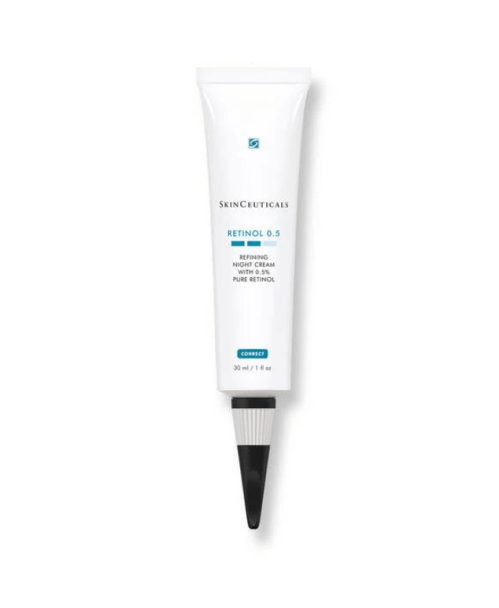
Skinceuticals, Retinol 0.5 — $88.00
While great for promoting cell turnover and reducing uneven skin color, this concentrated retinol cream from Skinceuticals is potent and effective. It contains 0.5 percent pure retinol and a stabilized formula to help minimize the potential of irritation while upholding the strength of the retinol. Not to mention, it’s non comedogenic (aka, non-clogging).
Pros:
- Promotes cell turnover
- Non-comedogenic
- Fragrance-, paraben-, and gluten-free
Cons:
- Expensive
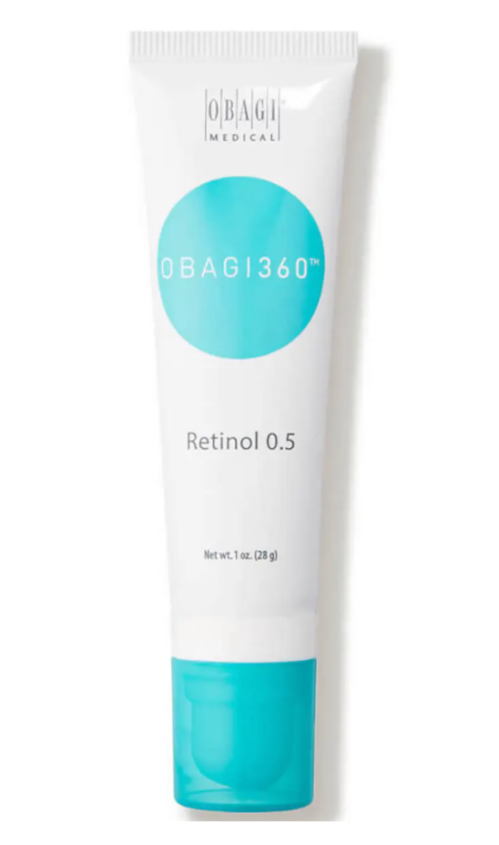
Obagi Medical, Obagi360 Retinol 0.5 — $68.00
This retinol cream is a favorite among some dermatologists, since it has several ingredients to help really pack on the moisture, including jojoba oil and shea butter. Together, they help promote firmness and better elasticity in the skin.
Pros:
- Fights acne and discoloration
- Promotes new cell growth
Cons:
- Expensive
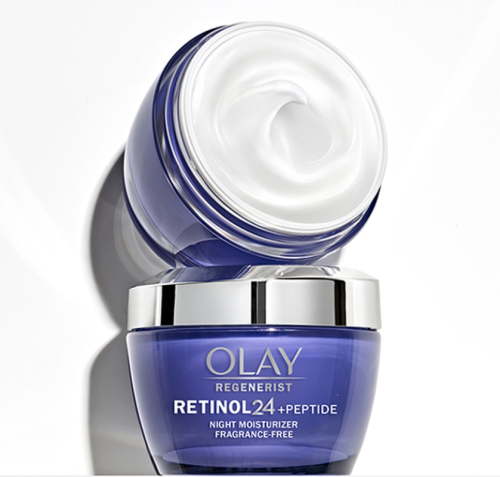
Olay, Regenerist Retinol24 + Peptide Night Face Moisturizer — $30.00
This Olay face moisturizer is tried-and-true—and for good reason. And the brand’s Regenerist Retinol 24 + Peptide is an even more potent version of the original. Not only is it one of the more affordable options on this list at $30, but it also contains hydrating ingredients like niacinamide and amino peptides. Together these elements can help tackle dull skin and increase the skin’s firmness, while giving you much-needed hydration.
Pros:
- Affordable
- Firms skin
- Hydrating
Cons:
- May cause buildup and pilling for some
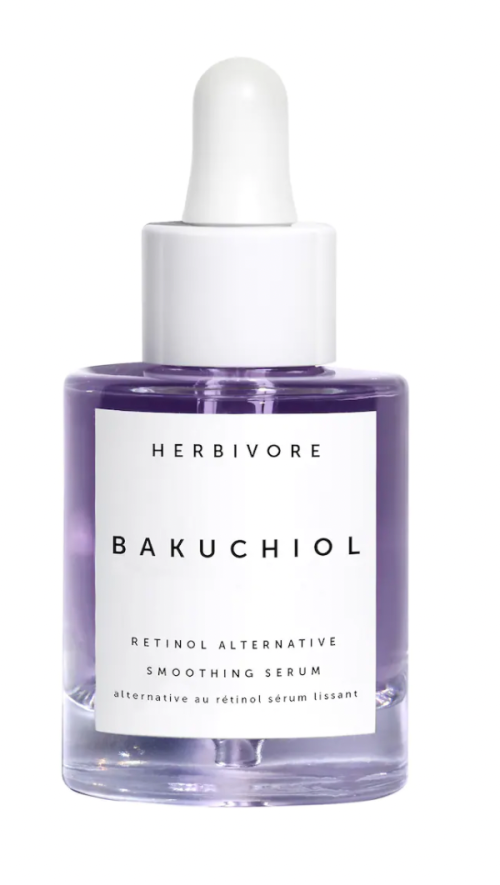
Herbivore, Bakuchiol Retinol Alternative Smoothing Serum — $56.00
For those who may be sensitive to the effects of retinol, bakuchiol is an ingredient that you need on your radar ASAP. Although it’s not a replacement for retinol, dermatologists agree that it can be effective for those who can’t tolerate retinol, such as people with sensitive skin and nursing parents.
“Bakuchiol is derived from an Asian plant and its seeds and acts on the skin to up-regulate retinol receptors—proteins [in] the skin that help with skin turnover and many of the skin rejuvenating benefits that retinols afford,” says Melanie Palm, MD, a board-certified dermatologist and cosmetic surgeon. “Bakuchiol tends to decrease redness and irritancy of the skin compared to retinol,” Palm continues. It’s even something she adds to retinols and trinoids to help with tolerance.
Pros:
- Smooths fine lines and wrinkles
- Lightweight
- Vegan and cruelty-free
Cons:
- Expensive
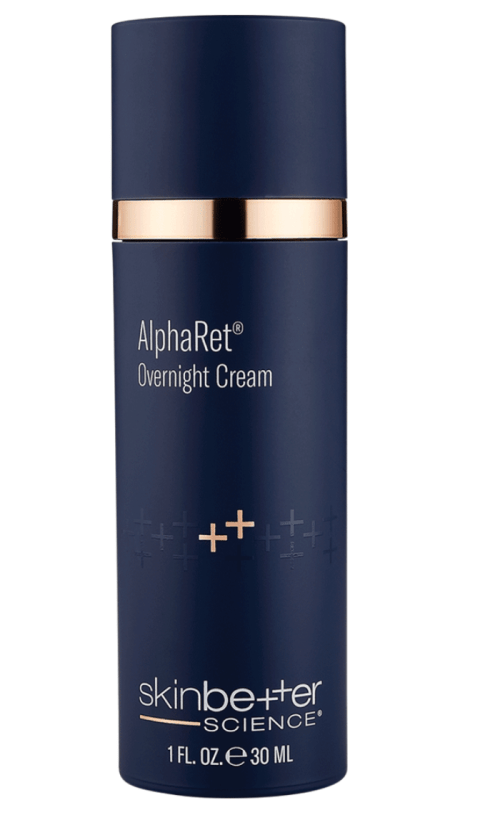
SkinBetter, AlphaRet Overnight Cream — $135.00
Although a bit pricey, this night cream formula is truly one of the best, according to Robert Finney, MD FAAD, board-certified Dermatologist in NYC at Entière Dermatology. While the formula is potent, it’s also very well thought-out and backed by real, hardcore data. What makes it so strong is that it “actually combines [retinol] with a little bit of lactic and glycolic acid, which allows the retinoic acid to penetrate quicker,” says Finney, who adds, “So it’s not sitting on the surface of the skin and cycling there waiting to penetrate in to the skin.”
Pros:
- Formulated with retinoid and AHA
- Fragrance-, cruelty-, and paraben-free
- Reduces fine lines and wrinkles
Cons:
- Expensive
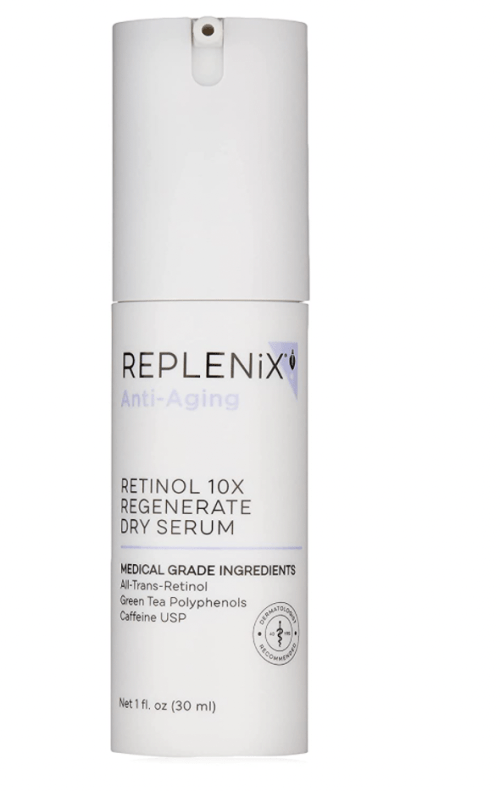
Replenix, RetinolForte Treatment Serum — $100.00
If you’re looking for a retinol serum, this one comes derm-recommended. Made with special green tea technology, this “medical grade” retinol treatment serum is packed with antioxidants that help curb irritation and quell signs of inflammation. It also contains caffeine to wake up tired-looking skin.
Pros:
- Unscented
- Formulated with green tea
- Quells irritation
Cons:
- Expensive
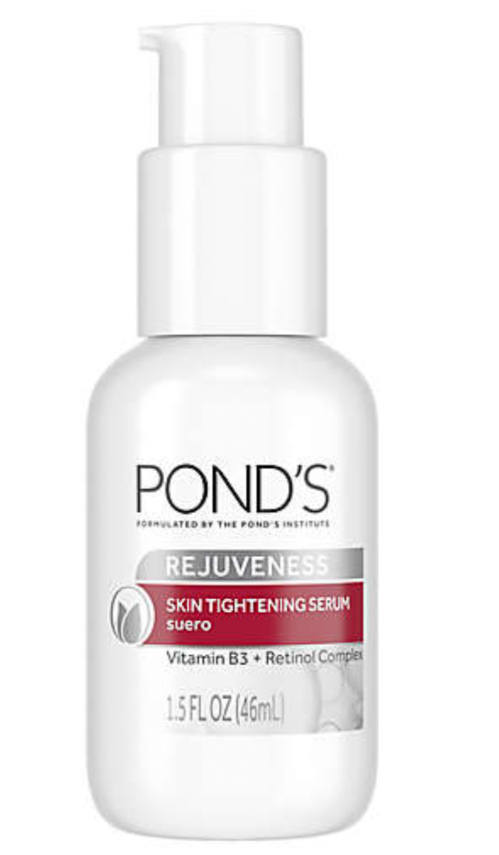
Pond's, Rejuveness Skin Tightening Serum — $15.00
If you’re looking for a budget-friendly retinol option, this is definitely one to consider. For $8, you certainly get a bang for your buck with this serum, thanks to its vitamin B3 and retinol as a one-two-punch combo that’s designed to help reduce signs of aging and boost the skin’s elasticity.
Pros:
- Affordable
- Formulated with retinol and vitamin B3
- Improves skin texture
Cons:
- May feel sticky for some
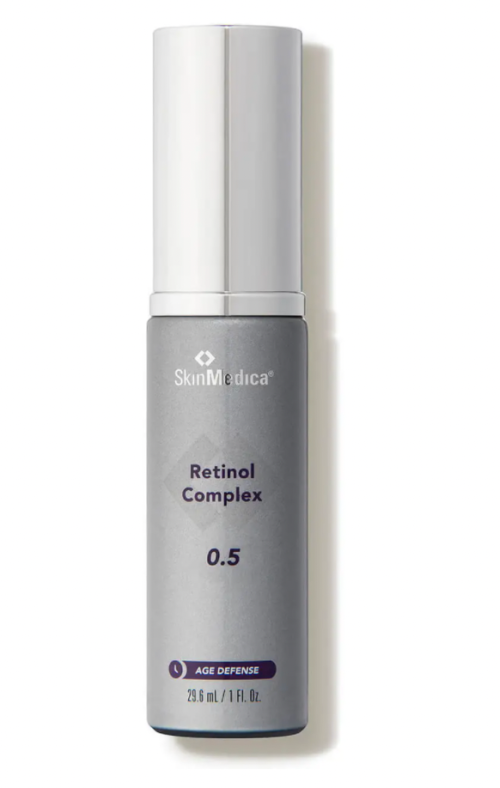
SkinMedica, Age Defense Retinol Complex 0.5 — $80.00
One of Palm’s personal picks is this retinol treatment from SkinMedica. Apart from the retinol ingredient itself, it also contains algae extract and a special formula of antioxidants to help soften and hydrate the skin so your skin barrier isn’t easily irritated.
Pros:
- Improves skin texture
- Hydrating formula
Cons:
- Expensive
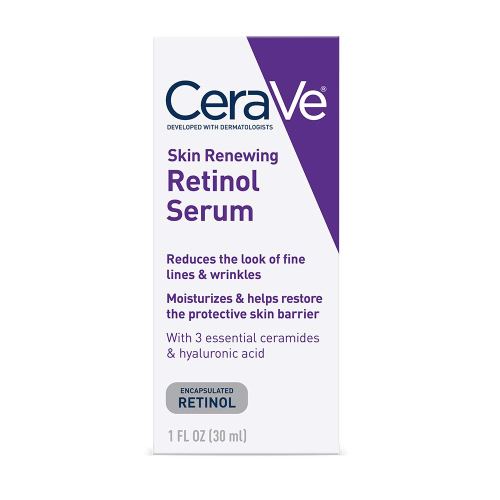
CeraVe, Renewing Retinol Serum — $25.00
CeraVe’s retinol serum is a top recommendation from Rina Allawh, MD, FAAD, board-certified dermatologist. In addition to having retinol, it’s formulated with three ceramides to restore the skin’s protective barrier. It’s gentle on the skin, but if you still have any skin irritation, Dr. Allow suggests using a shorter contact time (e.g., applying at dinner and then washing it off before bed), or mixing it with a nighttime noncomedogenic moisturizer and starting one to two nights weekly until you increase your tolerance.
Pros:
- Affordable
- Hydrating thanks to hyaluronic acid
- Fragrance-free
Cons:
- Dispenser can be finicky
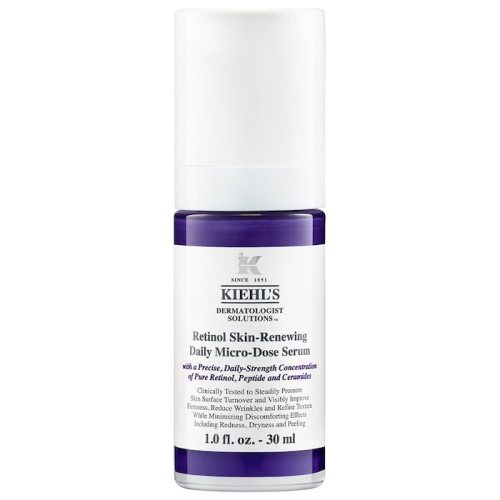
Kiehl's, Micro-Dose Anti-Aging Retinol Serum — $65.00
Dermatologist Dr. Michelle Henry of Skin & Aesthetics Surgery of Manhattan likes this retinol by Kiehls because “it has precise microdosing and it is formulated for the most sensitive skin types.” It’s a fragrance-free, lightweight cream with ceramides and peptides that absorb quickly.
Pros:
- Reduces the appearance of fine lines
- Improves skin texture
- Formulated with blend of pure retinol, ceramides, and peptides
Cons:
- Expensive
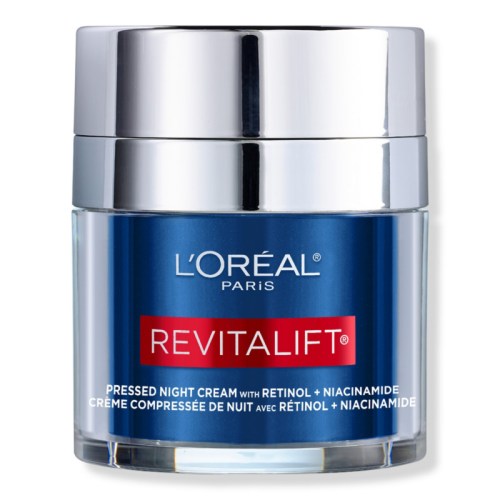
L'Oreal Paris, Revitalift Pressed Night Cream with Retinol — $28.00
This night cream has retinol and nourishing oils to provide moisturize and reduce wrinkles while you sleep. It’s also another pick from Dr. Henry, who says it “contains niacinamide to make it very soothing, and it is packaged in a very high tech bottle to help preserve its potency.” The jar is designed to provide single doses of cream with a press, keeping the rest of cream fresh for later use.
Pros:
- Reduces wrinkles
- Ideal for all skin types
- Fragrance- and paraben-free
- Hydrating
Cons:
- May be too potent for some
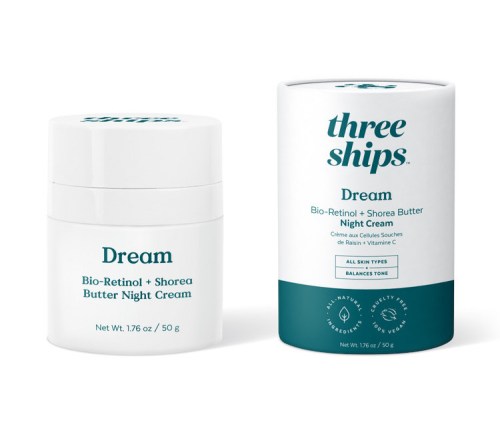
Three Ships, Dream Bio-Retinol Cream — $39.00
True to its name, Three Ships’ Dream is a total dream for skin. It comes highly recommended from Jeannette Graf, MD, a board-certified dermatologist and assistant clinical professor of dermatology at Mount Sinai School of Medicine. “As we age and develop fine lines, it is key to use retinol as well as keep the skin moisturized,” she previously told us. “This smooth night cream is ideal for nightly use to keep the skin hydrated and encourage skin cell turnover.”
Pros:
- Infused with vegan squalane and seed butters
- Improves skin tone
- Locks in moisture
Cons:
- May be too heavy for some
Best retinol creams for acne-prone skin
Best retinol creams for acne-prone skin
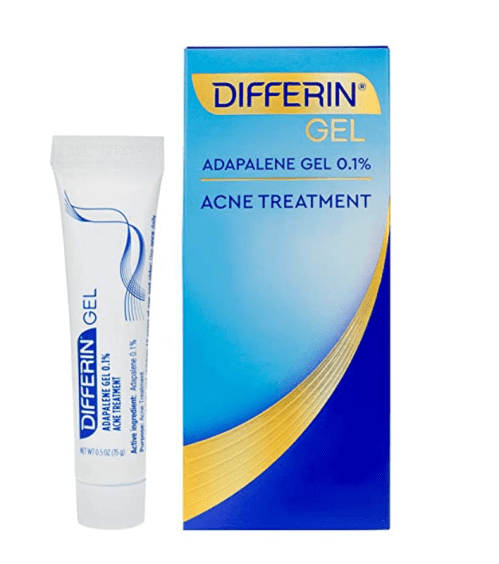
Differin, Adapalene Gel — $15.00
This tried-and-true formula really works. At one point, you could only get adapalene as a prescription, but now you can find it in just about any drugstore—and it’s FDA-approved. Adapalene is basically an over-the-counter retinoid that’s been clinically proven to be just as effective as tretinoin. Hadley King, MD, a board-certified dermatologist, previously told W+G that adapalene can reach higher concentrations in the skin, allowing it to work quickly. Its prescription-like strength and stabilized formula is what makes this a hands-down winner for those struggling with acne. Plus, it’s affordable.
Pros:
- Affordable
- FDA-approved
- Targets unclogged pores
Cons:
- May take a while to see results
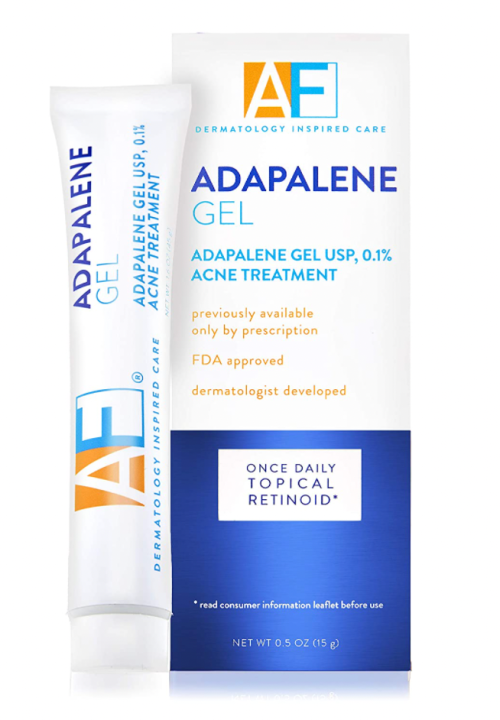
Acne Free, Adapalene — $14.00
This is the same style as the night cream above, just a little bit of a remix. The adapalene ingredient shines on its own here to help unclog pores and clear acne, among other skin concerns.
Pros:
- Fragrance-free
- FDA-approved
- Affordable
Cons:
- May be too drying for some
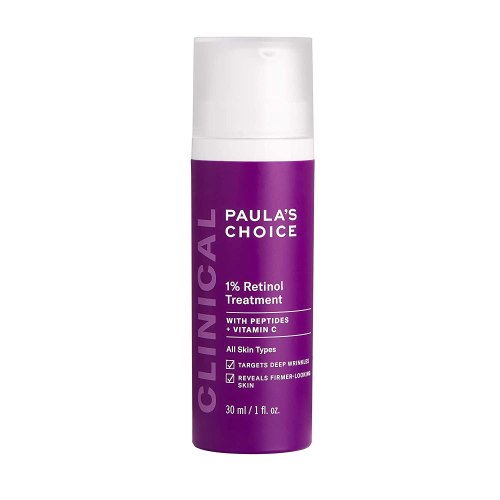
Paula's Choice, 1% Retinol Treatment — $62.00
Derm-founded brand Paula’s Choice makes this clinical lotion that hydrates on an even, controlled-release cadence. It’s also enriched with nourishing naturals, like licorice and oat extract, that soothe the skin even when the retinol is working hard.
Pros:
- Fast-absorbing formula
- Lightweight
- Reduces the appearance of fine lines and wrinkles
Cons:
- Expensive
Best retinol creams for wrinkled skin
Best retinol creams for wrinkled skin
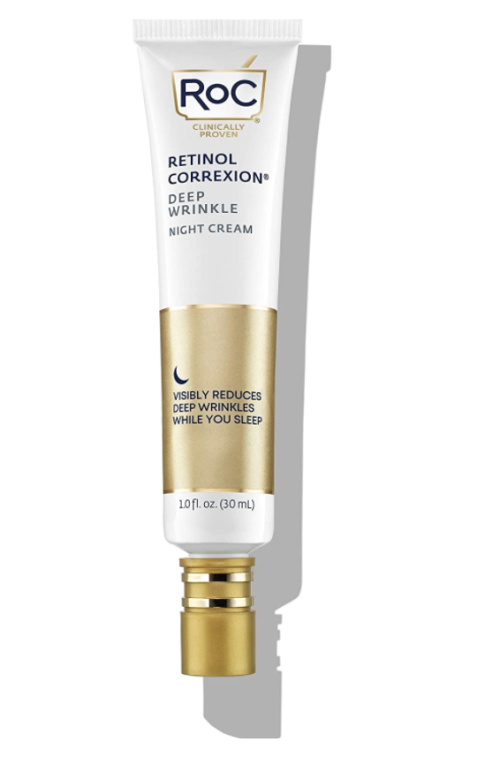
RoC, Retinol Correxion Deep Wrinkle Anti-Aging Retinol Night Cream — $20.00
Made with a non-oily and non-comedogenic formula, this RoC cream is actually stuff of legend among regular skin-care lovers and dermatologists alike. Part of the reason for that is it’s stabilized, which means it won’t easily upset your skin. “I’m a big fan of the RoC Retinol Correction,” Zeichner says. “The product uses a stabilized form of retinol in a hydrating base that minimizes potential irritation.”
Pros:
- Formulated with glycerin
- Reduces the appearance of fine lines and wrinkles
- Affordable
Cons:
- Some may not like the smell
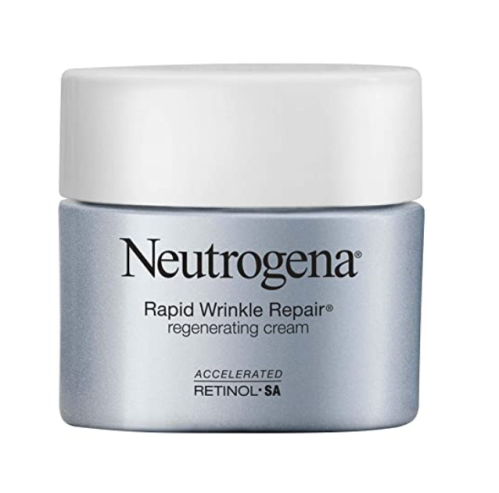
Neutrogena, Rapid Wrinkle Repair Retinol Regenerating Anti-Aging Face Cream — $29.00
For just under $29, this Neutrogena retinol cream is a steal. Designed to help target deep wrinkles on your face and neck, this formula is packed with hyaluronic acid to turn up the hydration on your face so your skin looks and feels good.
Pros:
- Formulated with hyaluronic acid
- Good value
- Reduces the appearance of fine lines and wrinkles
- Free of mineral oils, parabens, and dyes
Cons:
- May cause peeling
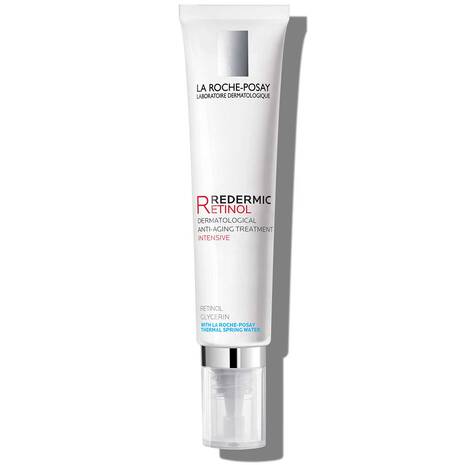
La Roche Posay, Redermic R Cream — $55.00
La Roche Posay is a goldmine for derm-approved products that won’t break the bank. While this one is a little pricier than most of its other skin-savers, it’s worth it—the pure retinol formula works hard to diminish fine lines, while the LHAs brighten and lighten the skin.
Pros:
- Reduces the appearance of fine lines, wrinkles, and age spots
- Lightweight formula
- Improves skin texture
Cons:
- Expensive
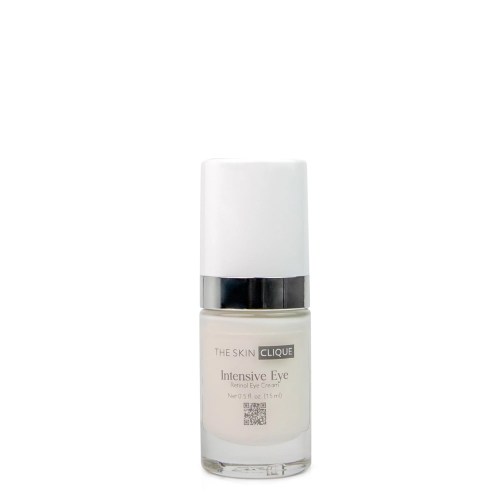
The Skin Clique, Retinol Eye Cream — $110.00
If you’re worried about fine lines and wrinkles around your eyes, Skin Clique’s Retinol Eye Cream has got you covered. Formulated with retinol, peptides, and hydrators, this eye cream does double duty to hydrate parched skin while minimizing the appearance of wrinkles. To use, apply once or twice daily.
Pros:
- Formulated with retinol and peptides
- Easy to use
- Brightens the under-eye area
Cons:
- Expensive
FAQs
What is the difference between a retinol cream and retinol serum?
The truth is, you can’t go wrong with either retinol cream or retinol serum. The main difference between the two comes down to their consistency and how they play nice with your other skin-care products. Because retinol serums are lighter by nature, you can freely pair them together with a moisturizer. However, retinol creams are thicker and often have more hydrating ingredients already built in, so you don’t have to apply an additional moisturizer. For those who prefer a simple beauty regimen, it may be better to opt for retinol cream over the serum.
“If you’re lazy and have no steps to [your routine] and you want to add a retinol, a retinol night cream that’s going to have hydrating ingredients is going to be better,” says Finney. “If you’re already using a very good moisturizer and you want something lighter weight, [use] a serum.”
How do you apply and use retinol?
While you may be tempted to slather a gum ball drop of retinol on your face in hopes of accelerating results, you should take it slow. (Patience, young grasshopper. Patience.) As a general rule, you should start off using a pea-size amount on your face just twice a week, otherwise you run the risk of betraying your skin and causing unnecessary irritation, according to Palm. “First use only every third night for two weeks, then every other night for two weeks, then nightly within about a month as tolerated,” says Palm. In this way, your skin can calmly adjust to the frequency.
And remember: retinol isn’t for everyone. Pregnant people are advised not to take the vitamin A derivative—or any retinoid for that matter—due to potential risks associated with childbirth. Also, when choosing a retinol cream, it’s important to remember that there’s no one-size-fits-all. You must always take into consideration your skin type, tolerance, and intention of using the product. When all else fails, it’s best to stick to trusted brands with a history of credible skin-care practices.
How should retinol be used in a skin-care routine?
Dr. Zeichner recommends using retinol in the evening, before bed, “as this is the time that cell turnover is known to naturally be at its highest. So it mechanistically makes sense to use it at night to enhance this activity.”
What retinol ingredients do dermatologists recommend?
There are three main topical retinoids available over the counter: retinyl esters, pure retinol, and retinaldehyde. “Retinyl esters like retinyl propionate are the most stable in formulation and the best tolerated,” says Dr. Zeichner. Because of this, it makes it a great option for beginners or for people with sensitive skin.
Then we have pure retinol—which “is probably the most commonly used topical retinoid in over-the-counter skin-care products,” he adds.
Lastly, there’s retinaldehyde. It’s the most potent out of the three and is likely to cause the most amount of irritation, says Dr. Zeichner. “So I usually reserve it for people who do not have sensitive skin or in those who want to graduate from using another product.”
How should retinol be used if it’s someone’s first time using it?
Because topical retinoids are known to cause irritation in the first two to four weeks, Dr. Zeichner recommends combining it with at least one other hydrating non-retinol like a moisturizer or serum and applying retinol every other night to let your skin adjust.
“After that initial period of retinization, it is okay to use it every night so long as your skin can tolerate it,” Dr. Zeichner explains. If at any point you develop redness, dryness, peeling, or itching, he recommends skipping a night until your skin adjusts.
“The effects of retinol takes several weeks to start to kick in. Unlike exfoliating or plumping products that contain ingredients like hyaluronic acid, where you can see immediate results, you must stick to your retinol routine before you will notice the benefits,” he adds.
Sign up for the Well+Good SHOP Newsletter
Get exclusive deals on wellness, beauty, fitness, and food products that have been hand-picked by our editors.
Got it, you've been added to our email list.



